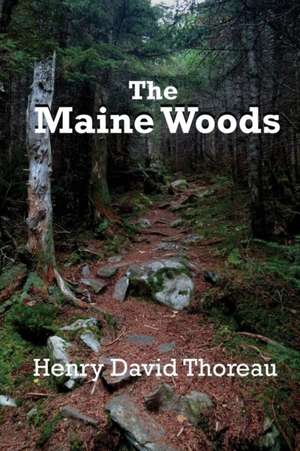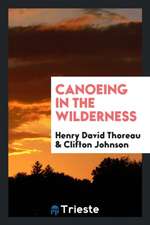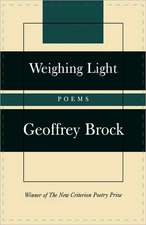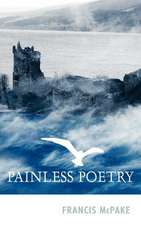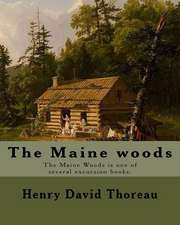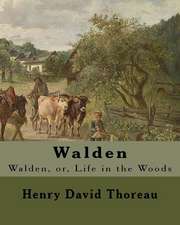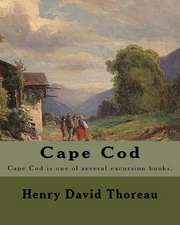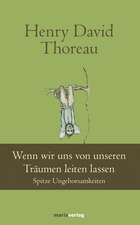The Maine Woods
Autor Henry David Thoreauen Limba Engleză Paperback – 15 mar 2014
| Toate formatele și edițiile | Preț | Express |
|---|---|---|
| Paperback (9) | 75.87 lei 6-8 săpt. | |
| Penguin Books – 31 aug 1988 | 97.72 lei 3-5 săpt. | |
| Westwinds Press – 31 ian 2014 | 103.26 lei 3-5 săpt. | |
| CREATESPACE – | 118.91 lei 3-5 săpt. | |
| Digireads.com – 17 iun 2019 | 75.87 lei 6-8 săpt. | |
| Lulu.Com – 11 iul 2018 | 89.57 lei 6-8 săpt. | |
| Black Curtain Press – 15 mar 2014 | 98.31 lei 6-8 săpt. | |
| Digireads.com – 31 dec 2005 | 103.03 lei 38-44 zile | |
| Bibliotech Press – 12 iul 2023 | 116.17 lei 6-8 săpt. | |
| COSIMO CLASSICS – 30 iun 2009 | 126.78 lei 6-8 săpt. | |
| Hardback (1) | 205.81 lei 6-8 săpt. | |
| Bibliotech Press – 12 iul 2023 | 205.81 lei 6-8 săpt. |
Preț: 98.31 lei
Nou
Puncte Express: 147
Preț estimativ în valută:
18.81€ • 19.53$ • 15.69£
18.81€ • 19.53$ • 15.69£
Carte tipărită la comandă
Livrare economică 24 martie-07 aprilie
Preluare comenzi: 021 569.72.76
Specificații
ISBN-13: 9781627555920
ISBN-10: 1627555927
Pagini: 226
Dimensiuni: 152 x 229 x 13 mm
Greutate: 0.34 kg
Editura: Black Curtain Press
ISBN-10: 1627555927
Pagini: 226
Dimensiuni: 152 x 229 x 13 mm
Greutate: 0.34 kg
Editura: Black Curtain Press
Cuprins
FOREWORD:
“DEEP IN THE WOODS WITH
HENRY THOREAU” by Richard F. Fleck
INTRODUCTORY NOTE
KTAADN
CHESUNCOOK
THE ALLEOASH AND EAST BRANCH
APPENDIX
I. Trees
II. Flowers and Shrubs
III. List of Plants
IV. List of Birds
V. Quadrupeds
VI. Outfit for an Excursion
VII. A List of Indian Words
“DEEP IN THE WOODS WITH
HENRY THOREAU” by Richard F. Fleck
INTRODUCTORY NOTE
KTAADN
CHESUNCOOK
THE ALLEOASH AND EAST BRANCH
APPENDIX
I. Trees
II. Flowers and Shrubs
III. List of Plants
IV. List of Birds
V. Quadrupeds
VI. Outfit for an Excursion
VII. A List of Indian Words
Notă biografică
Henry David Thoreau (July 12, 1817 - May 6, 1862) was an American essayist, poet, and philosopher. A leading transcendentalist, Thoreau is best known for his book Walden, a reflection upon simple living in natural surroundings, and his essay "Civil Disobedience", an argument for disobedience to an unjust state.
Thoreau's books, articles, essays, journals, and poetry amount to more than 20 volumes. Among his lasting contributions are his writings on natural history and philosophy, in which he anticipated the methods and findings of ecology and environmental history, two sources of modern-day environmentalism. His literary style interweaves close observation of nature, personal experience, pointed rhetoric, symbolic meanings, and historical lore, while displaying a poetic sensibility, philosophical austerity, and Yankee attention to practical detail. He was also deeply interested in the idea of survival in the face of hostile elements, historical change, and natural decay; at the same time he advocated abandoning waste and illusion in order to discover life's true essential needs.
He was a lifelong abolitionist, delivering lectures that attacked the Fugitive Slave Law while praising the writings of Wendell Phillips and defending the abolitionist John Brown. Thoreau's philosophy of civil disobedience later influenced the political thoughts and actions of such notable figures as Leo Tolstoy, Mahatma Gandhi, and Martin Luther King Jr.
Descriere
Descriere de la o altă ediție sau format:
Posthumously published in 1864 The Maine Woods, depicts Henry David Thoreau’s experiences in the forests of Maine, and expands on the author’s transcendental theories on the relation of humanity to Nature. On Mount Katahdin, he faces a primal, untamed Nature. Katahdin is a place “not even scarred by man, but it was a specimen of what God saw fit to make this world.” In Maine he comes in contact with “rocks, trees, wind and solid earth” as though he were witness to the creation itself. Of equal importance, The Maine Woods depicts Thoreau’s contact with the American Indians and depicts his tribal education of learning the language, customs, and mores of the Penobscot people. Thoreau attempts to learn and speak the Abenaki language and becomes fascinated with its direct translation of natural phenomena as in the word sebamook—a river estuary that never loses is water despite having an outlet because it also has an inlet. The Maine Woods illustrates the author’s deeper understanding of the complexities of the primal wilderness of uplifted rocky summits in Maine and provides the reader with the pungent aroma of balsam firs, black spruce, mosses, and ferns as only Thoreau could. This new, redesigned edition features an insightful foreword by Thoreau scholar Richard Francis Fleck.
